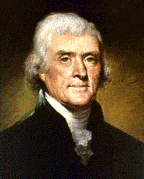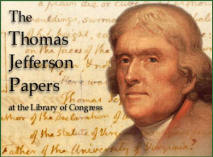Thomas Jefferson, Liberal
Jefferson was, many historians
believe, among the most brilliant men ever to occupy the
Presidency. President John F. Kennedy welcomed 49 Nobel
Prize winners to the White House in 1962, saying, "I
think this is the most extraordinary collection of
talent, of human knowledge, that has ever been gathered
at the White House, with the possible exception of when
Thomas Jefferson dined alone."

He was the primary author of the
Declaration of Independence, and a source of many
other contributions to American culture. Achievements of
his presidency include the
Louisiana Purchase and the
Lewis and Clark Expedition. He is also
considered one of the leaders of the
separation between church and state as he believed
that a majority could easily overrun the "natural
rights" of the minority, as the Church of England and
monarchy did in Britain.
Jefferson was a great believer in the
uniqueness and the potential of the United States and is
often classified a forefather of
American exceptionalism.
Jefferson's political principles were
heavily influenced by
John Locke (particularly relating to the principles
of
inalienable rights and
popular sovereignty) and by
Jean-Jacques Rousseau. He was a proponent of
"Enlightenment" and "The Age of Reason", which is
reflected in the Declaration of Independence.
The goal of the Enlightenment was to
establish an authoritative
ethics,
aesthetics, and
knowledge based on an "enlightened" rationality. The
movement's leaders viewed themselves as a courageous
body of intellectuals who were leading the world toward
progress, out of a long period of irrationality,
superstition, and tyranny which began during a
historical period they called the
Dark Ages. This movement provided a framework for
the
American Revolution.
Dignity, equality, liberty and
property
The early 19th century saw the primary
ideological conflict within liberalism brought forward.
The two key concepts of liberalism are the dignity and
equality of the individual and the right to individual
liberty, particularly to own and control private
property. These two principles found themselves in
conflict, when it became obvious that the property
rights of some individuals could not be reconciled with
the dignity of others. The extreme case of this was
chattel slavery, where one person was viewed as
another person's property. Generally, in this conflict,
the weight of liberal thought tilted towards the
importance of human dignity, viewed increasingly by
liberals as more fundamental than the claims of
property. However, balancing these two fundamental
values still explains a series of conflicts within
liberal thought.
As Thomas Jefferson explained (from
Virginia, where keeping slaves, his own included, was
deeply entrenched):
"Where the disease [slavery] is most
deeply seated, there it will be slowest in eradication.
In the northern States, it was merely superficial and
easily corrected. In the southern, it is incorporated
with the whole system and requires time, patience, and
perseverance in the curative process."
As Jefferson and Washington
sought to liberalize the State’s slavery laws to make it
easier to free slaves, the State Legislature went in
exactly the opposite direction, passing laws making it
more difficult to free slaves. (As one example,
Washington was able to circumvent State laws by freeing
his slaves in his will at his death in 1799; by the time
of Jefferson’s death in 1826, State laws had so
stiffened that it had become virtually impossible for
Jefferson to use the same means.)
 Unequal
Wealth Unequal
Wealth
The late 19th century saw the
expansion of voting rights, education and economic
progress in the form of industrialism. It also saw the
expansion of trade, and therefore opportunity, as well
as an explosive growth in the spread of culture and
literacy. At the same time, it produced vast
inequalities of wealth, and vast human misery in the
form of famines, child labor, polluted urban centers,
and deep poverty for the majority of the population. The
conflict between property and dignity came forward. One
strain of liberal thought demanded laws against child
labor, and requiring minimum standards of work and
wages, while the laissez-faire strain argued that
such laws were an unjust imposition on property and a
hindrance to economic development. Thomas
Jefferson warned against organizations growing so large
that they become tyrannical.
Republicans believe in
laissez-faire and seek to abolish liberal laws that
protect children, our health and our collective wealth.
There is much discussion as whether Jefferson was a
Republican, liberal or libertarian. Beyond labels,
Jefferson was a man of reason who believed in the power
of an educated populace and the potential tyranny of
unrestricted business to strip individuals of their
natural rights. Progressives draw upon his beliefs
that a democratic government "..by the people and for
the people" is worth fighting for.
From
Wikipedia, the free encyclopedia. All images
are from the Library of Congress, and are believed to be in the Public Domain.
|



